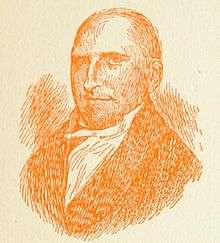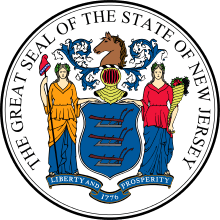William Sanford Pennington
| William Sanford Pennington | |
|---|---|
 | |
| Judge of the United States District Court for the District of New Jersey | |
|
In office January 9, 1816 – September 17, 1826 | |
| Appointed by | James Madison |
| Preceded by | Robert Morris |
| Succeeded by | William Rossell |
| 6th Governor of New Jersey | |
|
In office October 29, 1813 – June 19, 1815 | |
| Preceded by | Aaron Ogden |
| Succeeded by |
William Kennedy as Acting Governor |
| Personal details | |
| Born |
November 7, 1757 Newark, New Jersey |
| Died |
September 27, 1826 Newark, New Jersey |
| Spouse(s) |
Phoebe Wheeler (c. 1760–1804) Elizabeth Pierson (c. 1765–1840) |
William Sanford Pennington (November 7, 1757 – September 17, 1826) was the sixth Governor of New Jersey, serving from 1813 to 1815.[1] From 1815 to 1826 he served as a United States federal judge.[2][3]
Biography
Pennington was born on November 7, 1757 to Mary Sanford and Samuel Pennington in Newark, New Jersey. He joined the Continental Army during the American Revolutionary War. In 1777 he was promoted to a sergeant in the Second Regiment of Artillery. He was promoted to second lieutenant in 1780. At the end of the war he was brevetted a captain by an Act of Congress.[4]
Marriage
Pennington married Phoebe Wheeler around 1786. They had ten children including William Pennington (1796–1862) who became Governor of New Jersey and Speaker of the United States House of Representatives. After the death of his wife in 1804, he married Elizabeth Pierson (c. 1765–1840) on July 13, 1805.[4]
Law and politics
After leaving the army, he read law in the Newark, New Jersey office of Elias Boudinot. He served in the New Jersey General Assembly in 1797, 1798, and 1799. He was elected to the New Jersey Legislative Council in 1801 and reelected in 1802. In 1802 he was admitted to the New Jersey State Bar. From 1803 to 1804 he served as the clerk for Essex County, New Jersey. He also served as U.S. Attorney for the District of New Jersey from 1803 to 1804.[3] In 1805 he was elected to fill a vacancy in the New Jersey Supreme Court, where he remained until 1813. In 1812, Pennington was the Republican candidate for Governor of New Jersey and the following year won the gubernatorial election, becoming governor from 1813 to 1815.[3][4]
On June 19, 1815, Pennington received a recess appointment from James Madison to a seat on the United States District Court for the District of New Jersey. The position had been filled by Robert Morris. He was officially nominated on January 8, 1816 and confirmed by the United States Senate on January 9, 1816. He was seated as a judge on January 16, 1816.[1][3][4]
He died on September 17, 1826 in Newark, New Jersey.[1][2]
Legacy
His papers are archived with The New Jersey Historical Society in Newark, New Jersey.[4] Pennington, New Jersey is named for him.
See also
References
- 1 2 3 "William Sanford Pennington". Biographical Directory of Federal Judges. Federal Judicial Center. Retrieved 2011-11-22.
- 1 2 Francis Samuel Drake (1879). Dictionary of American biography: including men of the time ... and a supplement. Houghton; Osgood. p. 705. Retrieved 22 November 2011.
- 1 2 3 4 "A Rich History of Public Service". United States Department of Justice. Retrieved 22 November 2011.
William Sanford Pennington left the United States Attorney's Office in 1804 to become an Associate Justice of the New Jersey Supreme Court, and in 1813 he became the governor of New Jersey. (His son, William Pennington, would later be the governor of New Jersey from 1837 to 1843.) From 1815 until his death in 1826, Pennington served as the United States District Judge for the District of New Jersey.
- 1 2 3 4 5 "William Sanford Pennington". New Jersey Historical Society. Retrieved 2011-11-22.
Further reading
- William Sanford Pennington at the Biographical Directory of Federal Judges, a public domain publication of the Federal Judicial Center.
| Political offices | ||
|---|---|---|
| Preceded by Aaron Ogden |
Governors of New Jersey October 29, 1813 - June 19, 1815 |
Succeeded by William Kennedy Acting Governor |
| Legal offices | ||
| Preceded by Robert Morris |
Judge of the United States District Court for the District of New Jersey 1816–1826 |
Succeeded by William Rossell |
| |||||||||||||||||||||||||||||||||
| ||||||
|
